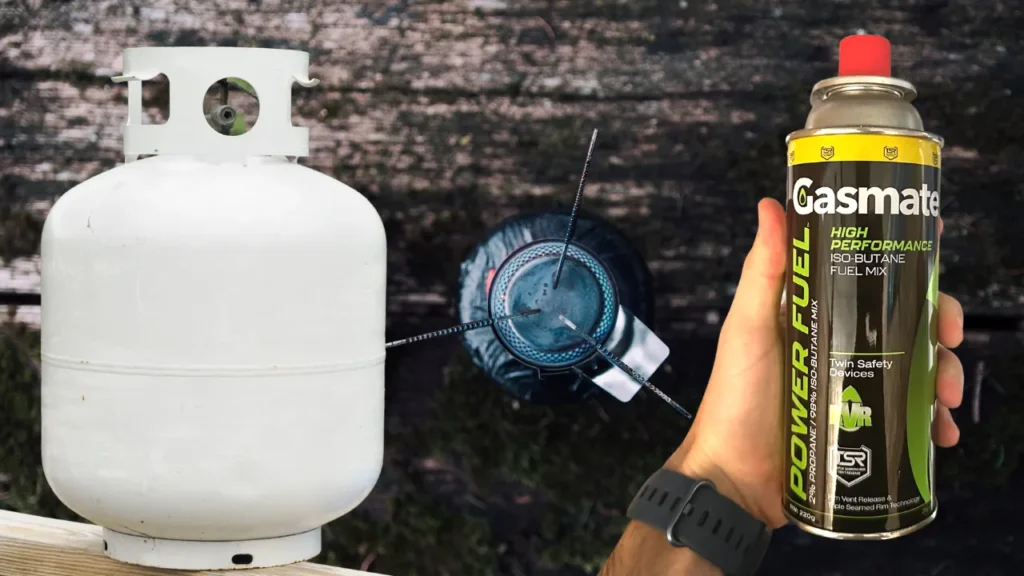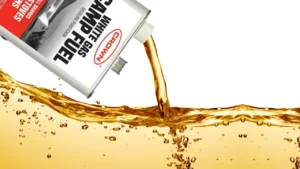If you’re a weekend camper like me you’re probably also a fan of butane, which is inexpensive and comes in lightweight containers. Since it’s not the only LPG, you might wonder how it stacks up with propane and if it burns hot enough for your cooking or applications.
Butane burns at a maximum temperature of 3,578℉ /1,970℃ under adiabatic or optimal conditions. However, in real life butane’s maximum flame temperature is 2,610℉/1,430℃ to account for heat loss, altitude, amount of oxygen in the air and the quality of the butane used.
A butane stove’s flame temperature depends on its BTU rating, the setting you use and the surrounding conditions.
If you’re considering investing in a butane camp stove, it’s a good idea to understand how hot it burns under various conditions and whether it’s more effective than propane.
Does Butane Burn Hotter Than Propane?

Butane doesn’t burn hotter than propane. Butane’s maximum flame temperature under optimal conditions is only 2,610℉/1,430℃ while propane’s is 3,600℉/2,000℃.
This is because butane has less energy per gram and a lower flame velocity. However, the actual flame temperature your stove produces will depend on its BTU rating, the altitude and surrounding conditions.
Butane has a BTU rating of 20,900 per lb whereas propane’s is 21,700 per lb. It also has 49.5 MJ (megajoules) per kg while propane has 50.35, making it slightyle less.
Butane has fewer molecules per gram than propane, meaning it is less fuel efficient and not as dense as propane.
Although propane has a higher flame temperature than butane, its ultimate heat output for stoves and heaters is quite similar and you’ll find it difficult to notice an actual overall difference.
For example, if you're bringing water to a boil you won't notice much of a difference (if any) between the time it takes to boil water on a butane stove vs the time it takes on a propane stove. The difference is negligible.
In contrast, if you’re using a welding torch, you’ll notice the difference in flame temperature more.
Butane Pros and Cons
Even though butane burns at a lower temperature than propane, it’s still worth considering its pros and cons:
Pros
- Butane comes in compact and lightweight canisters. This makes it more convenient for camping and especially shorter camping trips where you don't need a large propane tank.
- Butane is less toxic than propane. It’s safer to use a butane camping stove indoors than a propane one because butane produces fewer carbon monoxide and carbon dioxide when burned.
That said, you should still use it in a well-ventilated space and always have a carbon monoxide detector if you're cooking indoors.
Cons
- Butane isn’t as widely available as propane. You can buy both LPGs online or from outdoor stores. However, if you’re in the middle of nowhere you’re less likely to find butane at a rural gas station than propane.
- You can’t typically refill butane canisters. Refilling a non-refillable butane canister can be incredibly dangerous but many propane cylinders are refillable.
- You can only purchase butane in smaller quantities. Whereas propane comes in 20-40 lb tanks butane is usually only widely available in smaller 8-16 oz canisters. So if you need a lot of fuel (eg. for running an RV) propane is going to be an easier option.
- Butane doesn’t burn efficiently in very cold conditions. Using butane in temperatures lower than 40℉ can make it work less efficiently.
- It’s slightly more expensive than propane. While propane and butane are always fairly close in price butane is almost always slightly more expensive than propane. This is partly because propane can be bought in bulk.




